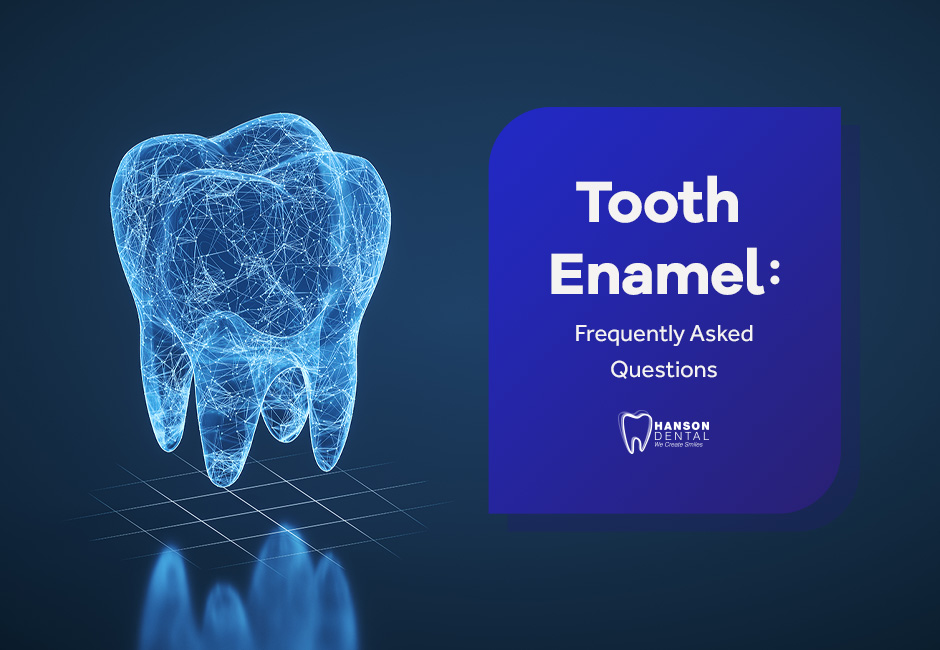You may hear the phrase “tooth enamel” tossed around on commercials, in magazine advertising, or even at your dental office. But do you really know what it is? Here are answers to some frequently asked questions about tooth enamel!
What is tooth enamel?
Tooth enamel is the hard, outermost layer of your teeth. It’s there to protect your teeth from the everyday wear and tear of chewing, biting, and grinding. Enamel also helps to insulate your teeth from hot and cold temperatures.
Tooth enamel is made up of minerals, including calcium and phosphate. These minerals are constantly being deposited and removed from your teeth in a process known as remineralization and demineralization.
What can damage tooth enamel?
There are many things that can damage or weaken tooth enamel, including:
- Acids: Foods and drinks with a high acid content can cause the loss of minerals in tooth enamel. This process is called demineralization. Examples of acidic foods and drinks include citrus fruits, tomatoes, sports drinks, and soda.
- Brushing too hard: Brushing your teeth too hard can cause wear and tear on tooth enamel.
- Grinding: Clenching or grinding your teeth can put a lot of pressure on tooth enamel and cause it to break down over time.
- Dry mouth: saliva helps to protect tooth enamel by washing away food and bacteria. If you have a condition that causes dry mouth, you may be at a higher risk for tooth enamel damage.
How can I protect my tooth enamel?
There are several things you can do to protect your tooth enamel, including:
- Brushing and flossing regularly: This will help to remove plaque and bacteria from your teeth.
- Using a soft-bristled toothbrush: A soft-bristled toothbrush will be gentle on your teeth and gums.
- Avoiding acidic foods and drinks: If you do eat or drink something acidic, be sure to brush your teeth soon after.
- Wearing a mouthguard: If you grind your teeth at night, a mouthguard can help to protect your teeth from wear and tear.
- Visit your dentist regularly: Your dentist can help to identify any areas of concern and offer suggestions for protecting your tooth enamel.
If you’re concerned about tooth enamel damage, be sure to talk to your dentist. They can help you develop a plan to protect your teeth!
What are the symptoms of weakened tooth enamel?
Signs of weakened or damaged tooth enamel include:
- Sensitivity to hot, cold, or sweet foods and drinks
- Visible holes or pits in your teeth
- Yellowing or staining of your teeth
- Rough spots on your teeth
If you notice any of these symptoms, be sure to talk to your dentist. They can help you determine the cause and develop a plan to treat and protect your teeth!
Can I rebuild tooth enamel?
Unfortunately, tooth enamel can’t be rebuilt, nor does it “regrow” once it’s damaged. However, it can be remineralized. This means that minerals can be added back to the tooth enamel. This can help to protect your teeth from further damage and decay. This natural process takes several months.
How do you remineralize your teeth?
- Use a fluoride toothpaste
- Chew gum that is sugar-free
- Use a fluoride mouth rinse
- Avoid acidic foods and drinks
- Visit your dentist regularly for professional cleanings and checkups
It’s not hard to take care of this hard, beneficial layer of your teeth, but it does take consistency and routine care. These steps will help to keep your smile healthy and bright for years to come!
Should you have questions or concerns about your tooth enamel, be sure to ask us. We can help you determine the best way to care for your teeth and keep your smile healthy.
Image credit: Jian Fan / iStock / Getty Images Plus

